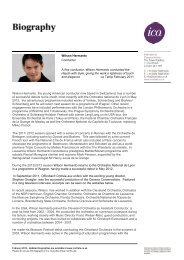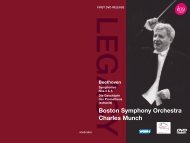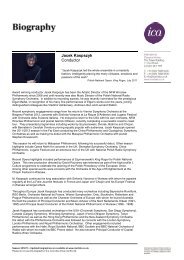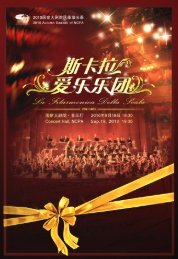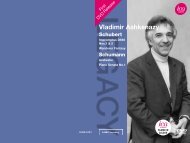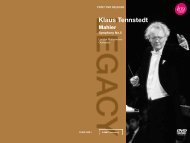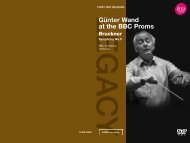to download - International Classical Artists
to download - International Classical Artists
to download - International Classical Artists
Create successful ePaper yourself
Turn your PDF publications into a flip-book with our unique Google optimized e-Paper software.
FIRST DVD RELEASE<br />
Mstislav Rostropovich<br />
Benjamin Britten<br />
Tchaikovsky<br />
Rococo Variations<br />
Pezzo capriccioso<br />
Romeo and Juliet<br />
Overture<br />
Britten<br />
Gloriana (extracts)<br />
Peter Pears<br />
The Aldeburgh<br />
Festival Singers<br />
English Chamber<br />
Orchestra<br />
ICAD 5025<br />
FILMED IN<br />
COLOUR
1 Introduction <strong>to</strong> ICA Classics 2.58<br />
PYOTR ILYICH TCHAIKOVSKY 1840–1893<br />
Variations on a Rococo Theme op.33<br />
2 Modera<strong>to</strong> assai quasi andante 1.39<br />
3 Tema: Modera<strong>to</strong> semplice 1.40<br />
4 Variazione I: Tempo del Tema 0.52<br />
5 Variazione II: Tempo del Tema 1.18<br />
6 Variazione III: Andante sostenu<strong>to</strong> 3.42<br />
7 Variazione IV: Andante grazioso 1.50<br />
8 Variazione V: Allegro modera<strong>to</strong> 3.16<br />
9 Variazione VI: Andante 2.46<br />
10 Variazione VII e Coda: Allegro vivo 2.30<br />
11 Pezzo capriccioso op.62 7.53<br />
12 Romeo and Juliet – Fantasy Overture 21.11<br />
MSTISLAV ROSTROPOVICH cello<br />
English Chamber Orchestra<br />
Leader: Emanuel Hurwitz<br />
BENJAMIN BRITTEN<br />
Producer: Brian Large<br />
Recorded: Snape Maltings Concert Hall, Aldeburgh, 16 June 1968<br />
Broadcast: Tchaikovsky Concert from Snape, 23 June 1968<br />
© BBC 1968<br />
For a free promotional DVD sampler including highlights from the<br />
ICA Classics DVD catalogue, please email info@icaclassics.com.<br />
For ICA Classics<br />
Executive Producer: Stephen Wright<br />
Head of DVD: Louise Waller-Smith<br />
Executive Consultant: John Pattrick<br />
Music Rights Executive: Aurélie Baujean<br />
ICA Classics gratefully acknowledges the assistance of the Britten-Pears Foundation, Elena Silina, Elizabeth Wilson,<br />
Olga Maximova François de Navailles and Decca Music Group Limited<br />
DVD Studio Production<br />
DVD Studio: msm-studios GmbH<br />
Studio Producer: Johannes Müller<br />
Screen Design: Hermann Enkemeier<br />
DVD Authoring & Video Encoding: Benjamin Fritz<br />
Audio Postproduction & Encoding: Chris<strong>to</strong>ph Stickel & Philip Lewis<br />
Video Postproduction: Michael Hartl<br />
Project Management: Herbert Fraungruber<br />
DVD Packaging<br />
Product Management: Cat Gill & Harry Robson for WLP Ltd<br />
Booklet Editing: Sue Baxter & Laura Sandford for WLP Ltd<br />
Introduc<strong>to</strong>ry Note & Translations © 2012 <strong>International</strong> <strong>Classical</strong> <strong>Artists</strong> Ltd<br />
Cover Pho<strong>to</strong>: RIA Novosti / Alamy<br />
Art Direction: Georgina Curtis for WLP Ltd<br />
π 2012 BBC, under licence <strong>to</strong> <strong>International</strong> <strong>Classical</strong> <strong>Artists</strong> Ltd<br />
Licensed courtesy of BBC Worldwide<br />
The sound on this DVD has been improved with Enhanced Mono. During the remastering of this original mono programme,<br />
the audio signal has been res<strong>to</strong>red <strong>to</strong> give a wider and more open sound which, though not equivalent <strong>to</strong> a stereo recording,<br />
improves the quality of the original source and provides a richer sound experience.<br />
BONUS<br />
BENJAMIN BRITTEN 1913–1976<br />
Gloriana op.58<br />
© Copyright 1953 by Hawkes & Sons (London) Ltd<br />
13 The Tournament 4.41<br />
14 The Lute Song* 4.56<br />
15 Apotheosis 7.10<br />
*Peter Pears tenor<br />
The Aldeburgh Festival Singers<br />
English Chamber Orchestra<br />
Leader: Kenneth Silli<strong>to</strong><br />
BENJAMIN BRITTEN<br />
Produced and directed by Brian Large<br />
Recorded: Snape Maltings Concert Hall, Aldeburgh, 5 June 1970<br />
Broadcast: Music for a Royal Occasion, 5 June 1970<br />
© BBC 1970<br />
2<br />
ICA CLASSICS is a division of the management agency <strong>International</strong> <strong>Classical</strong> <strong>Artists</strong> Ltd (ICA). The label features archive material<br />
from sources such as the BBC, WDR in Cologne and the Bos<strong>to</strong>n Symphony Orchestra, as well as performances from the agency’s own<br />
artists recorded in prestigious venues around the world. The majority of the recordings are enjoying their first commercial release.<br />
The ICA Classics team has been instrumental in the success of many audio and audiovisual productions over the years, including<br />
the origination of the DVD series The Art of Conducting, The Art of Piano and The Art of Violin; the archive-based DVD series<br />
Classic Archive; co-production documentaries featuring artists such as Richter, Fricsay, Mravinsky and Toscanini; the creation of<br />
the BBC Legends archive label, launched in 1998 (now comprising more than 250 CDs); and the audio series Great Conduc<strong>to</strong>rs<br />
of the 20th Century produced for EMI Classics.<br />
WARNING: All rights reserved. Unauthorised copying, reproduction, hiring, lending, public performance and broadcasting<br />
prohibited. Licences for public performance or broadcasting may be obtained from Phonographic Performance Ltd.,<br />
1 Upper James Street, London W1F 9DE. In the United States of America unauthorised reproduction of this recording<br />
is prohibited by Federal law and subject <strong>to</strong> criminal prosecution.<br />
Made in Austria<br />
3
ROSTROPOVICH, BRITTEN AND TCHAIKOVSKY<br />
These recordings represent an overview of some of the headiest years of Mstislav Rostropovich’s<br />
career, during which he made his name in the West, was exiled from his homeland for his support<br />
of dissident artists, poets and musicians, and established himself as a major international force for<br />
(not just the musical) good. By the time he died in 2007 he had become a cultural Olympian, being<br />
awarded in that year the Gold UNESCO Mozart Medal. The recordings also offer some unusual<br />
glimpses of Britten himself.<br />
Rostropovich had emerged as one of the most significant musicians in the Soviet Union when he<br />
made his Western debut in Liège in 1963. Through his friend and teacher Dmitri Shostakovich, he<br />
was introduced <strong>to</strong> Benjamin Britten. Britten was inspired by him <strong>to</strong> compose his Cello Symphony,<br />
premiered in Moscow in March 1964, and <strong>to</strong> follow it with the three Cello Suites – arguably the<br />
most important body of solo cello music since Bach. Much of this is reflected on this disc, in<br />
particular Rostropovich’s association with Benjamin Britten, and through him, his involvement in<br />
the Aldeburgh Festival.<br />
From 1948, when he resigned his studentship at the Moscow Conserva<strong>to</strong>ire in disgust at the Stalinist<br />
regime’s treatment of his composition teacher, Shostakovich, Rostropovich was always there when<br />
a political statement had <strong>to</strong> be made. And he made it through his music. Twenty years later, the<br />
year of the Aldeburgh performance documented here, he appeared at the Proms in London with a<br />
Soviet orchestra, the day after Warsaw Pact forces had invaded Czechoslovakia, playing the Dvořák<br />
Concer<strong>to</strong>. The intensity of the performance, in an atmosphere of political tension, was something<br />
those present will never forget.<br />
It was not long after meeting Britten that Rostropovich became a regular performer at the Aldeburgh<br />
Festival. He <strong>to</strong>ok part in the first televised concert from the Snape Maltings Concert Hall, part of which<br />
is included here. This is a particularly poignant film, since it is virtually the only record we have of the<br />
Maltings as it was before it was destroyed by fire in 1969 and rebuilt in time for the 1970 Festival, as<br />
seen in the bonus of this DVD.<br />
Tchaikovsky wrote the Variations on a Rococo Theme for Wilhelm Fitzenhagen, a fellow professor<br />
at the Moscow Conserva<strong>to</strong>ire, who gave the premiere in Moscow in November 1877. Tchaikovsky<br />
allowed Fitzenhagen <strong>to</strong> make radical alterations in the piece, and it was only in 1941 that his original<br />
intentions were rediscovered. However, Rostroprovich said he did not think he should discard the<br />
Fitzenhagen arrangement, since it had Tchaikovsky’s approval at the time, otherwise he would not<br />
have let it be published.<br />
Rostropovich’s Aldeburgh performance displays him at the peak of his powers and is a wonderful<br />
example of his partnership with Britten, of whom this is rare conducting footage. Supported by him,<br />
the theme seems <strong>to</strong> expand under Rostropovich’s bow, the music, as it were, being composed on<br />
the spot. The slow variation is suspended daringly, with moments of heart-s<strong>to</strong>pping intensity, and<br />
the fleet-fingered fast sections in the coda are as<strong>to</strong>nishingly dexterous, the <strong>to</strong>ne and in<strong>to</strong>nation never<br />
faltering even at the highest pitches.<br />
The subject of Fitzenhagen’s radical alterations came up again ten years after the premiere of the<br />
Variations when Ana<strong>to</strong>ly Brandukov, one of Fitzenhagen’s students for whom Tchaikovsky wrote<br />
the Pezzo capriccioso, asked whether he would res<strong>to</strong>re them <strong>to</strong> his original idea. Tchaikovsky is<br />
supposed <strong>to</strong> have replied: ‘Oh, the hell with it! Let it stay the way it is.’ He composed the Pezzo<br />
capriccioso in one week in 1887. A smaller-scale work than the Variations, it is nevertheless invested<br />
by Rostropovich with all his poetry and intensity, making it seem much more substantial.<br />
The excerpts from Britten’s opera Gloriana (Gloriana was the contemporary poetic name for<br />
Elizabeth I) included as the bonus of this DVD are a highly significant addition <strong>to</strong> the composer’s<br />
discography. The opera was based on the book Elizabeth and Essex by Lyt<strong>to</strong>n Strachey, and<br />
composed for the Coronation of 1953. It was premiered in June at Covent Garden under John<br />
Pritchard, <strong>to</strong> the general bafflement of the glittering audience. After <strong>to</strong>uring in 1954 the opera<br />
virtually disappeared from view, apart from occasional concert hearings of the Courtly Dances from<br />
Act II. It began <strong>to</strong> be heard more after Britten’s revision of 1966. This performance, marking the<br />
re-opening of the Snape Maltings in June 1970, <strong>to</strong>ok place in the presence of HM the Queen, but<br />
Gloriana had <strong>to</strong> wait until 2003 for a complete, though semi-staged, performance at Aldeburgh,<br />
almost the fiftieth anniversary of its premiere.<br />
While Britten conducted recordings of most of his operas on disc, Gloriana was not one of them, so<br />
that this is the only hint we have of his approach <strong>to</strong> any of the score. If Britten was a highly respected<br />
conduc<strong>to</strong>r of other composers’ music, his directing of his own is on a wholly different plane. His<br />
gestures are more free, his energy level higher.<br />
The well-chosen sections, forming an unusual concert suite, comprise the <strong>to</strong>urnament from Act I, the<br />
Lute Song, also from Act I, and music culled from Act III as a kind of flashback including references<br />
<strong>to</strong> the chorus of homage, and the lute song, as the elderly Queen reviews her life. The <strong>to</strong>urnament<br />
between the rivals for the Queen’s favour, Essex and Lord Mountjoy, is an energetic soundscape of<br />
syncopated fanfares, much scurrying by the strings, and complex choral exclamations.<br />
The Lute song comes from later in Act I when Essex sings it in private parley with the Queen. This<br />
performance is a momen<strong>to</strong>us occasion. The role of Essex was created for Britten’s lifetime partner<br />
and inspiration, Peter Pears. He reprises it here in the presence of the Queen, <strong>to</strong> whom it is<br />
dedicated, and who was supposed originally not <strong>to</strong> have been over-enthused by the work but surely<br />
would have been consulted about the programming of this concert. In the opera it is sung <strong>to</strong> her<br />
great Tudor predecessor, and in this concert in her presence, it is sung, it might seem, with profound<br />
intensity of feeling, as much <strong>to</strong> Her Majesty as <strong>to</strong> Britten himself.<br />
4 5<br />
Chris de Souza
ROSTROPOVITCH, BRITTEN ET TCHAÏKOVSKY<br />
Ces enregistrements offrent une vue d’ensemble des années les plus passionnantes de la carrière<br />
de Mstislav Rostropovitch, durant lesquelles il se fit un nom en Occident, fut banni de son pays<br />
pour avoir soutenu divers artistes dissidents, et s’affirma comme un ambassadeur du bien (et pas<br />
seulement de l’excellence musicale) de premier plan. Lorsqu’il disparut en 2007, il était devenu un<br />
mythe culturel, décoré justement cette année-là de la Médaille d’or Mozart de l’UNESCO. Ces<br />
enregistrements offrent aussi un aperçu inhabituel sur Britten lui-même.<br />
Lors de ses débuts occidentaux à Liège, en 1963, Rostropovitch était apparu comme l’un des<br />
musiciens majeurs de l’Union soviétique. Par l’entremise de son ami et professeur Dmitri<br />
Chostakovitch, il fut présenté à Benjamin Britten. Il inspira à ce dernier sa Symphonie pour<br />
violoncelle, créée à Moscou en mars 1964, puis ses trois Suites pour violoncelle – sans doute<br />
le corpus de musique pour violoncelle seul le plus important depuis les Suites de Bach. Tout cela<br />
transparaît nettement sur ce disque, notamment l’association qui a uni Rostropovitch à Benjamin<br />
Britten et, à travers celui-ci, l’implication du violoncelliste dans le Festival d’Aldeburgh.<br />
Depuis 1948, année où, écœuré par la manière dont le régime stalinien traitait Chostakovitch,<br />
son professeur de composition, il avait rendu sa carte d’étudiant du Conserva<strong>to</strong>ire de Moscou,<br />
Rostropovitch était <strong>to</strong>ujours là quand il fallait prendre position, et il le faisait à travers sa musique.<br />
Vingt ans plus tard, l’année du concert d’Aldeburgh présenté ici, il se produisit aux Proms de<br />
Londres, jouant le Concer<strong>to</strong> de Dvořák avec un orchestre soviétique le lendemain du jour où les<br />
troupes du Pacte de Varsovie avaient envahi la Tchécoslovaquie. L’intensité de son interprétation,<br />
dans un contexte politique très tendu, est quelque chose que <strong>to</strong>us ceux qui assistaient au concert<br />
n’oublieront jamais.<br />
C’est peu de temps après avoir rencontré Britten que Rostropovitch fut invité régulièrement au<br />
Festival d’Aldeburgh, notamment pour le premier concert télévisé retransmise depuis la salle de<br />
Snape Maltings dont on peut voir ici un extrait. Ce témoignage est d’autant plus poignant qu’il s’agit<br />
pratiquement des seules images filmées que nous ayons de cette salle telle qu’elle était avant d’être<br />
détruite par un incendie en 1969 ; elle fut reconstruite juste à temps pour l’édition 1970 du Festival,<br />
comme on le voit sur le bonus de ce DVD.<br />
Tchaïkovsky écrivit les Variations sur un thème rococo pour Wilhelm Fitzenhagen, l’un de ses<br />
collègues enseignants du Conserva<strong>to</strong>ire de Moscou, qui en donna la création dans la capitale<br />
russe en novembre 1877. Tchaïkovsky permit à Fitzenhagen d’apporter de profondes modifications<br />
à son ouvrage, et ce n’est qu’en 1941 que l’on redécouvrit les intentions originales du compositeur.<br />
Toutefois, Rostropovitch déclara qu’il n’avait pas de raison de rejeter l’arrangement de Fitzenhagen<br />
puisqu’à l’époque celui-ci avait bénéficié de l’approbation de Tchaïkovsky qui autrement n’en aurait<br />
pas au<strong>to</strong>risé la publication.<br />
La prestation de Rostropovitch à Aldeburgh nous le montre au faîte de ses capacités et c’est un<br />
merveilleux exemple de son partenariat avec Britten, que l’on a ici l’occasion rare de voir diriger.<br />
Porté par le compositeur, le thème semble s’élargir sous l’archet de Rostropovitch, comme si la<br />
musique était écrite sous nos yeux. La variation lente est audacieusement suspendue, avec des<br />
moments d’une intensité épous<strong>to</strong>uflante, et les sections rapides et virtuoses de la coda sont jouées<br />
avec une dextérité renversante, le son et la justesse ne faiblissant jamais, même sur les notes les<br />
plus aiguës.<br />
Le sujet des profondes modifications de Fitzenhagen revint sur le tapis dix ans après la création des<br />
Variations quand Ana<strong>to</strong>ly Brandoukov, l’un des élèves de Fitzenhagen pour qui Tchaïkovsky écrivit le<br />
Pezzo capriccioso, demanda au compositeur s’il comptait revenir à son idée originale. Tchaïkovsky<br />
aurait répliqué : “Oh, la barbe! La partition peut bien rester comme ça.” Il composa le Pezzo<br />
capriccioso en une semaine, en 1887. Bien qu’il s’agisse d’une œuvre de proportions plus réduites<br />
que les Variations, Rostropovitch lui insuffle tant de poésie et d’intensité que l’on a l’impression<br />
d’entendre un morceau bien plus substantiel.<br />
En guise de bonus, trois extraits de l’opéra Gloriana de Britten (Gloriana était le nom poétique<br />
que l’on donnait au XVI e siècle à Elisabeth I er ) forment une contribution d’une très grande importance<br />
à la discographie du compositeur. Cet opéra, qui s’appuie sur le livre Elizabeth and Essex de Lyt<strong>to</strong>n<br />
Strachey, a été composé pour le Couronnement d’Elisabeth II en 1953. La création eut lieu en juin à<br />
Covent Garden sous la direction de John Pritchard, à la stupéfaction générale d’un audi<strong>to</strong>ire brillant.<br />
Après avoir été présenté en <strong>to</strong>urnée en 1954, l’opéra disparut pratiquement <strong>to</strong>talement de la scène, à<br />
l’exception des Danses de cour du deuxième acte jouées parfois en concert . On commença à le<br />
réentendre de nouveau après sa révision effectuée par Britten en 1966. Cette représentation, qui<br />
marqua la réouverture du Snape Maltings Hall en juin 1970, eut lieu en présence de Sa Majesté la<br />
Reine, mais Gloriana dut attendre jusqu’en 2003 pour obtenir une représentation intégrale à Aldeburgh,<br />
en version semi-scénique, pratiquement pour le cinquantième anniversaire de sa création.<br />
Bien que Britten ait dirigé les enregistrements de la plupart de ses opéras au disque, Gloriana ne fait<br />
pas partie du lot. Cet enregistrement est donc la seule trace que nous ayons de sa conception<br />
de l’œuvre. Si Britten était interprète fort respecté de la musique des autres compositeurs, sa manière<br />
de diriger ses propres œuvres se situe sur un <strong>to</strong>ut autre plan. Ses gestes sont plus libres et son<br />
énergie plus grande.<br />
Les passages bien choisis entendus ici, qui constituent une suite de concert inhabituelle,<br />
comprennent le <strong>to</strong>urnoi du premier acte, la mélodie accompagnée au luth, également au premier acte,<br />
et des extraits du troisième acte organisés à la manière d’un flashback incluant un rappel du chœur<br />
d’hommage et la mélodie avec luth quand la Reine, âgée, se remémore le cours de sa vie. Le <strong>to</strong>urnoi<br />
entre Essex et Lord Mountjoy, deux rivaux luttant pour les faveurs de la Reine, est un paysage sonore<br />
énergique, de traits rapides aux cordes, et d’exclamations chorales complexes.<br />
6 7
La mélodie avec luth se situe à la fin du premier acte, c’est Essex qui la chante dans un entretien<br />
privé avec la Reine. Cette interprétation est un événement d’une grande importance. En effet, le rôle<br />
d’Essex a été créé par Peter Pears, le partenaire et la source d’inspiration de Britten <strong>to</strong>ut au long de<br />
sa vie. Il reprend la mélodie ici en présence de la Reine, à qui elle est dédiée. Il semble cependant<br />
que la Reine n’ait pas été trop enthousiasmée à l’origine par cette œuvre, mais elle a sûrement été<br />
consultée pour la programmation de ce concert. Dans l’opéra, la mélodie est chantée à la dernière<br />
reine de la dynastie des Tudor; dans ce concert, elle est chantée en présence de la Reine actuelle<br />
avec, semble-t-il, un sentiment d’émotion intense aussi bien envers Sa Majesté qu’envers Britten<br />
lui-même.<br />
Chris de Souza<br />
Traduction : David Ylla-Somers/Jean-Jacques Velly<br />
ROSTROPOVITSCH, BRITTEN UND TSCHAIKOVSKIJ<br />
Die vorliegenden Aufnahmen geben einen guten Überblick über einige der aufregendsten Jahre<br />
in der musikalischen Laufbahn von Mstislav Rostropovitsch, in denen er im Westen berühmt<br />
wurde, seine Heimat wegen seiner Unterstützung dissidenter Künstler, Dichter und Musiker 1974<br />
verlassen musste und sich als bedeutende Größe für das (nicht nur musikalische) Gute etablierte.<br />
Als er 2007 starb, war er zu einem Titanen der Kultur geworden und erhielt in jenem Jahr die<br />
Mozart-Goldmedaille der UNESCO. Die Aufnahmen gewähren außerdem auch ein paar<br />
ungewöhnliche Einblicke in den Menschen von Benjamin Britten.<br />
Rostropovitsch hatte sich zu einem der bedeutendsten Musiker in der Sowjetunion entwickelt, als<br />
er 1963 im Westen, in Lüttich, debütierte. Über seinen Freund und Lehrer Dmitrij Schostakovitsch<br />
wurde er Benjamin Britten vorgestellt. Britten ließ sich von Rostropovitsch zu seiner (im März 1964<br />
in Moskau uraufgeführten) Cello Symphony und danach zu den drei Cello-Suiten inspirieren –<br />
wohl die wichtigsten Kompositionen für Cello seit Bach. Vieles davon ist auf dieser DVD zu erleben,<br />
besonders Rostropovitschs Verbindung zu Benjamin Britten und damit auch seine Mitwirkung<br />
beim Aldeburgh Festival.<br />
Seit 1948, als Rostropovitsch auf sein Studium am Moskauer Konserva<strong>to</strong>rium aus Empörung<br />
über die Behandlung seines Kompositionslehrers Schostakovitsch durch das stalinistische Regime<br />
verzichtet hatte, war er immer zur Stelle, wenn es um eine politische Aussage ging. Und das machte<br />
er mit seiner Musik. 20 Jahre später, im Jahr der hier dokumentierten Aufführung in Aldeburgh,<br />
trat er mit einem sowjetischen Orchester bei den Londoner Proms auf, am Tag, nachdem Truppen<br />
des Warschauer Paktes in die Tschechoslowakei einmarschiert waren; bei diesem Prom-Konzert<br />
spielte er das Konzert von Dvořák. Die Intensität dieser Darbietung in einer politisch angespannten<br />
Atmosphäre werden die, die dabei waren, nie vergessen.<br />
Bald nach der Begegnung mit Britten trat Rostropovitsch regelmäßig beim Aldeburgh Festival auf.<br />
Er nahm am ersten im Fernsehen übertragenen Konzert aus dem Snape Maltings-Konzertsaal teil,<br />
von dem ein Ausschnitt hier enthalten ist. Dies ist ein besonders beeindruckender Film, da er<br />
praktisch der einzige Beleg der Snape Maltings aus der Zeit ist, bevor der Konzertsaal durch Feuer<br />
1969 zerstört wurde. Für das Festival 1970 wurde er rechtzeitig wiederaufgebaut, wie in den<br />
Bonustracks dieser DVD zu sehen ist.<br />
Tschaikovskij schrieb die Variationen über ein Rokoko-Thema für Wilhelm Fitzenhagen, einen<br />
Professorenkollegen am Moskauer Konserva<strong>to</strong>rium, der auch der Solist der Uraufführung im<br />
November 1877 in Moskau war. Tschaikovskij ließ zu, dass Fitzenhagen radikale Änderungen<br />
an dem Werk vornahm; erst 1941 wurde seine ursprüngliche Fassung wiederentdeckt.<br />
Rostropovitsch dachte allerdings nicht daran, die Bearbeitungen von Fitzenhagen zu verwerfen,<br />
da sie damals von Tschaikovskij gebilligt worden seien; andernfalls hätte dieser sie nicht<br />
erscheinen lassen.<br />
8 9
Rostropovitschs Auftritt in Aldeburgh zeigt ihn auf der Höhe seiner Kräfte und bietet ein wunderbares<br />
Beispiel seiner Partnerschaft mit Britten, der als Dirigent wie in diesem Filmmaterial nur selten<br />
zu sehen ist. Durch seine Unterstützung scheint sich das Thema unter Rostropovitschs Bogen<br />
auszudehnen, als wäre die Musik gerade dabei, komponiert zu werden. Die langsame Variation<br />
wird waghalsig mit Momenten von atemberaubender Intensität in die Länge gezogen, und die<br />
flinkfingrigen schnellen Abschnitte in der Coda sind bewundernswert gewandt, Klang und In<strong>to</strong>nation<br />
schwanken auch bei höchster Tonhöhe nie.<br />
Fitzenhagens radikale Änderungen kamen zehn Jahre nach der Premiere der Variationen erneut<br />
zur Sprache, als Ana<strong>to</strong>lij Brandukov, ein Student von Fitzenhagen, für den Tschaikovskij das<br />
Pezzo capriccioso geschrieben hatte, den Komponisten fragte, ob er die Variationen nach seinen<br />
ursprünglichen Vorstellungen wiederherstellen wolle. Tschaikovskij soll darauf geantwortet<br />
haben: “O, zur Hölle damit! Lass es so, wie es ist.” Das Pezzo capriccioso hatte er 1887 in einer<br />
Woche komponiert. Es ist ein Werk von geringerem Ausmaß als die Variationen; dennoch erfüllt<br />
Rostropovitsch es mit aller Poesie und Intensität und lässt es dadurch umso gehaltvoller erscheinen.<br />
Das Lautenlied erklingt später im 1. Akt, Essex singt es bei einer privaten Unterredung mit der<br />
Königin. Diese Darbietung ist eine bedeutsame Begebenheit. Die Rolle des Essex schrieb Britten<br />
für Peter Pears, der sein Lebenspartner und eine wichtige Inspirationsquelle war. Er wiederholt sie<br />
hier in Anwesenheit der Königin, der es gewidmet ist. Angeblich war sie zunächst nicht übermäßig<br />
enthusiastisch über die Oper, aber man hat sie sicher bei der Programmfolge für dieses Konzert auch<br />
konsultiert. In der Oper wird es vor ihrer großen Vorgängerin aus der Tudor-Dynastie gesungen, und<br />
in diesem Konzert nun in ihrer eigenen Präsenz, – und es scheint, mit der gleichen Gefühlsintensität<br />
sowohl für Ihre Majestät als auch für Britten selbst.<br />
Chris de Souza<br />
Übersetzung: Christiane Frobenius/Anne Schneider<br />
Die Ausschnitte aus Brittens Oper Gloriana (Gloriana war der zeitgenössische poetische Name der<br />
Königin Elizabeth I.), die als Extrazugabe auf dieser DVD enthalten sind, bilden eine höchst wichtige<br />
Ergänzung der Diskographie des Komponisten. Die Oper beruht auf dem Buch Elizabeth and Essex<br />
von Lyt<strong>to</strong>n Strachey und wurde für die Krönung von Elizabeth II. 1953 komponiert. Ihre Premiere fand<br />
im Juni des Jahres in Covent Garden unter der Leitung von John Pritchard statt − zur Verblüffung<br />
des glanzvollen Publikums. Nach einer Tournee 1954 verschwand die Oper fast völlig von der Bühne,<br />
abgesehen von gelegentlichen Konzertaufführungen der Höfischen Tänze aus dem zweiten Akt. Nach<br />
einer Überarbeitung Brittens im Jahr 1966 war das Werk jedoch wieder häufiger zu hören. Diese<br />
Aufnahme entstand anlässlich der Wiedereröffnung der Snape Maltings im Juni 1970 in Anwesenheit<br />
Ihrer Majestät der britischen Königin, doch die Oper Gloriana musste bis zum Jahr 2003, d.h. also<br />
bis zum 50. Geburtstag ihrer Premiere, auf eine komplette, jedoch halbszenische Aufführung in<br />
Aldeburgh warten.<br />
Britten dirigierte zwar Schallplattenaufnahmen von fast allen seinen Opern, doch Gloriana war<br />
nicht darunter. Daher ist dies der einzige Beleg, den wir von seinem interpreta<strong>to</strong>rischen Zugang<br />
zu dieser Partitur haben. Britten war als Dirigent der Musik anderer Komponisten höchst geachtet,<br />
doch die Dirigate seiner eigenen Werke liegen auf einer ganz anderen Ebene. Seine Gestik ist viel<br />
freier und sein Energieniveau höher.<br />
Die sorgfältig ausgewählten Abschnitte bilden eine ungewöhnliche Konzertsuite. Sie umfassen<br />
das Turnier aus dem 1. Akt, das Lautenlied ebenfalls aus dem 1. Akt sowie eine Musikauswahl aus<br />
dem 3. Akt, die Bezüge zum Huldigungschor und dem Lautenlied herstellt, so als betrachte die alte<br />
Königin ihr Leben in einer Art Rückblende. Das Turnier zwischen den Rivalen um die königliche<br />
Gunst, Essex und Lord Mountjoy, stellt eine kraftvolle Klanglandschaft aus synkopierten Fanfaren,<br />
dahinhuschenden Streicherklängen und vielschichtigen Chorausrufen dar.<br />
10 11
Also available on DVD and digital <strong>download</strong>:<br />
ICAD 5009<br />
R. Strauss: Ein Heldenleben<br />
Dvořák: Symphony No.9 ‘From the<br />
New World’<br />
Royal Philharmonic Orchestra<br />
BBC Symphony Orchestra<br />
Rudolf Kempe · Diapason d’or<br />
ICAD 5011<br />
Elgar: Symphony No.2 · Enigma Variations<br />
London Philharmonic Orchestra<br />
Sir Georg Solti · Diapason d’or<br />
ICAD 5024<br />
Wagner: Der fliegende Holländer – Overture<br />
R. Strauss: Don Juan<br />
Beethoven: Symphony No.5<br />
Orchestra of the Royal Opera House<br />
BBC Symphony Orchestra<br />
Sir Georg Solti · Telerama ‘Bravo’<br />
ICAD 5027<br />
Glinka: Ruslan and Lyudmila<br />
Three Dances from ‘A Life for the Tsar’<br />
Tchaikovsky: The Nutcracker – Act II<br />
BBC Symphony Orchestra<br />
Gennadi Rozhdestvensky<br />
Diapason d’or<br />
ICAD 5012<br />
Bach: Concer<strong>to</strong> for two violins<br />
Mozart: Sinfonia concertante<br />
Brahms: Violin Concer<strong>to</strong><br />
David Oistrakh · Igor Oistrakh<br />
English Chamber Orchestra · Sir Colin Davis<br />
Yehudi Menuhin · Kirill Kondrashin<br />
ICAD 5015<br />
Wagner: Orchestral excerpts<br />
from Die Meistersinger<br />
Franck: Symphony in D minor<br />
Fauré: Pelléas et Mélisande Suite<br />
Bos<strong>to</strong>n Symphony Orchestra<br />
Charles Munch · Diapason d’or<br />
ICAD 5030<br />
Les Sylphides · Giselle<br />
Svetlana Beriosova · Violetta Elvin<br />
Alicia Markova · John Field<br />
Nadia Nerina · Nikolai Fadeyechev<br />
Niels Bjørn Larsen · Lydia Sokolova<br />
Margaret Hill<br />
ICAD 5031<br />
R. Strauss: Till Eulenspiegel<br />
Ein Heldenleben<br />
London Symphony Orchestra<br />
Michael Tilson Thomas<br />
12<br />
13
ICAD 5037<br />
Vaughan Williams: Symphony No.8<br />
Job: A Masque for Dancing<br />
London Philharmonic Orchestra<br />
Sir Adrian Boult · Diapason d’or<br />
ICAD 5038<br />
Rachmaninov: The Bells<br />
Prokofiev: Lieutenant Kijé<br />
Sheila Armstrong · Robert Tear<br />
John Shirley-Quirk<br />
London Symphony Orchestra and Chorus<br />
André Previn<br />
ICAD 5049<br />
Bruckner: Symphony No.5<br />
BBC Symphony Orchestra<br />
Günter Wand<br />
ICAD 5050<br />
Tchaikovsky: Ballet Masterpieces<br />
Extracts from Sleeping Beauty, Swan Lake<br />
and The Nutcracker<br />
Margot Fonteyn · Michael Somes<br />
ICAD 5041<br />
Mahler: Symphony No.5<br />
London Philharmonic Orchestra<br />
Klaus Tennstedt · Diapason d’or<br />
ICAD 5042<br />
Schumann: Symphony No.4<br />
Mahler: Das Lied von der Erde<br />
Carolyn Watkinson · John Mitchinson<br />
BBC Philharmonic Orchestra<br />
Kurt Sanderling<br />
ICAD 5051<br />
Mahler: Symphony No.1<br />
Richard Strauss: Till Eulenspiegel<br />
Bos<strong>to</strong>n Symphony Orchestra<br />
Erich Leinsdorf<br />
ICAD 5052<br />
Schumann: Genoveva Overture<br />
Symphony No.2<br />
Schubert: Symphony No.5<br />
Bos<strong>to</strong>n Symphony Orchestra<br />
Charles Munch · Diapason d’or<br />
14<br />
15
ICAD 5059<br />
Beethoven: Egmont Overture<br />
Tchaikovsky: Symphony No.5<br />
Bos<strong>to</strong>n Symphony Orchestra<br />
Erich Leinsdorf · Diapason d’or<br />
ICAD 5064<br />
Mendelssohn: Symphony No.4 ‘Italian’<br />
Britten: Les Illuminations<br />
Handel · Beethoven<br />
Academy of St Martin in the Fields<br />
Sir Neville Marriner<br />
ICAD 5072<br />
Mahler: Symphony No.4<br />
Mozart: Symphony No.35 ‘Haffner’<br />
Bos<strong>to</strong>n Symphony Orchestra<br />
Klaus Tennstedt<br />
ICAD 5073<br />
Chopin: Ballade No.3 · Scherzo No.3<br />
Fantasy in F minor<br />
Beethoven: Piano Sonata No.23<br />
‘Appassionata’ · Piano Sonata No.32<br />
Van Cliburn · Claudio Arrau<br />
ICAD 5065<br />
Berlioz: Le Corsaire – Overture<br />
Tchaikovsky: Manfred Symphony<br />
Elgar · Prokofiev<br />
St Petersburg Philharmonic Orchestra<br />
Yuri Temirkanov<br />
ICAD 5067<br />
Haydn: Symphony No.55<br />
Beethoven: Symphonies Nos.7 & 8<br />
Bos<strong>to</strong>n Symphony Orchestra<br />
William Steinberg · Diapason d’or<br />
ICAD 5074<br />
Treasures of the Russian Ballet<br />
Galina Ulanova · Maya Plisetskaya<br />
Vladimir Vasiliev · Ekaterina Maximova<br />
Yuri Soloviev · Maris Liepa<br />
Raisa Struchkova<br />
ICAD 5058<br />
Les Sylphides · Coppélia<br />
Giselle (extract)<br />
Nadia Nerina · Robert Helpmann<br />
Margot Fonteyn · Rudolf Nureyev<br />
16<br />
17
BBC recordings in Decca Classics’ Britten–Pears Collection:<br />
ICAD 5082<br />
Stravinsky: The Rite of Spring<br />
Sibelius: Symphony No.5<br />
London Symphony Orchestra<br />
Leonard Bernstein<br />
ICAD 5083<br />
Mozart: Symphony No.40<br />
Britten: Nocturne<br />
Mendelssohn: Symphony No.3<br />
‘Scottish’ (extracts)<br />
Peter Pears · English Chamber Orchestra<br />
Benjamin Britten<br />
074 3261<br />
Britten: Peter Grimes<br />
Peter Pears · Heather Harper<br />
Bryan Drake · Elizabeth Bainbridge<br />
Ann Robson · Owen Brannigan<br />
Ambrosian Opera Chorus · LSO<br />
Benjamin Britten<br />
074 3256<br />
Britten: Billy Budd<br />
Peter Pears · Peter Glossop<br />
Michael Langdon · John Shirley-Quirk<br />
Ambrosian Opera Chorus · LSO<br />
Charles Mackerras<br />
ICAD 5088<br />
La Fille mal gardée<br />
Nadia Nerina · David Blair<br />
Stanley Holden · Sir Frederick Ash<strong>to</strong>n<br />
ICAD 5089<br />
Mendelssohn: Overture – A Midsummer<br />
Night’s Dream<br />
Brahms: Symphony No.1<br />
Chicago Symphony Orchestra<br />
Sir Georg Solti<br />
074 3330<br />
Britten: Owen Wingrave<br />
Benjamin Luxon · Peter Pears<br />
John Shirley-Quirk · Sylvia Fisher<br />
Heather Harper · Jennifer Vyvyan<br />
English Chamber Orchestra<br />
Benjamin Britten<br />
074 3366 (7 DVDs)<br />
The Britten-Pears Collection<br />
Peter Grimes · Billy Budd<br />
Owen Wingrave · The Beggar’s Opera<br />
Idomeneo · Winterreise<br />
18<br />
19



